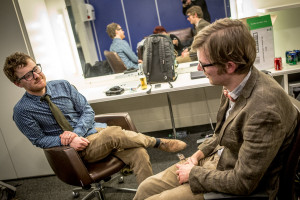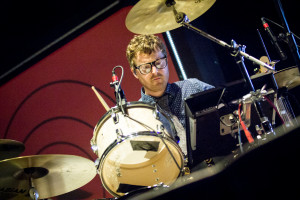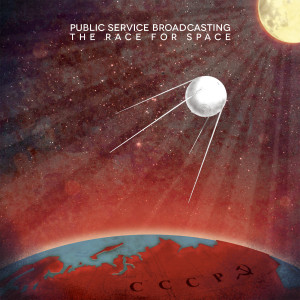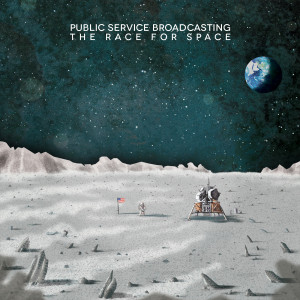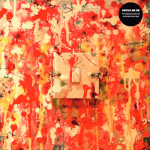To devoted aficionados of Public Service Broadcasting and their live ‘transmissions’, the South London duo’s tongue-in-cheek, vermouth-dry and distinctly British humour is a quintessential element of their act. Off-stage, the creative dynamic between J. Willgoose Esq., and his tub-thumping accomplice Wrigglesworth, betrays a deep affection and close friendship fuelled by comedic tensions. “It’s like a circle of waffle and abuse,” says Willgoose with an austere expression of mock fortitude. “He basically just gets the odd insult and I waffle on a bit more, and then he gives me a bit more abuse.” Wrigglesworth responds by suggesting Willgoose can do ‘a really good thoughtful pout’ for the photos. Get the picture?
Following last year’s tour with the Manic Street Preachers, PSB are back in action supporting Kaiser Chiefs on their UK tour. Wrigglesworth is positively beaming with delight. His musical partner is more reticent but appears equally pleased. “Not playing to your own crowd is always a bit daunting but it’s just really nice to be asked. These bands are doing big shows to very dedicated fans and they asked us to go on first. It’s quite nice to be asked. When else would we possibly get a chance to play arenas?! So let’s go for it and have fun.”
The pair, whose high-concept audio-visual performances bring together retro samples and archive film footage propelled by hooky melodies and urgent, pummelling drums, are modest about their DIY achievements, which include playing major festivals, international tours and widespread media coverage. They attribute their success to many years of hard work and “a bit of luck along the way”. Thinking about it, Willgoose adds, “We’re a bit unusual, which helps to stand out. And we don’t take ourselves too seriously, which may endear people to us a bit more.” Tracing their origins to Edinburgh fringe shows where “you’ve got 2 seconds to pitch to people”, he still occasionally voices his surprise “that people like this kind of music”. “Even the fact of not having a singer was supposed to mean we were not going to make it. You know, if people can’t sing along to your stuff at festivals you’re never going make that kind of connection with people. We obviously do have quite a strong emphasis on melody, which is always – I think – the most important thing in any music.”
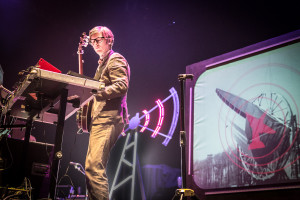
Although the duo’s British heritage is an important part of the equation, there is more to PSB than a mastery of irony, vintage propaganda reels, corduroy and a love of M&S chocolate flapjacks. Having already made use of American footage on both The War Room and the Reithian-inspired first LP, Inform – Educate – Entertain, their latest musical journey ‘Race for Space’ not only propels the project into the space-age of the 60s and 70s but pushes its frontiers into Russia, introducing a fresh linguistic and cultural dimension. As Willgoose points out, although foreign language samples are not an entirely new thing for PSB (“We did 2 tracks in Dutch”), this time they are integral to the story. “It makes you think about the way you’re using samples. In a way, it was because of the way Russian was translated into English in the films that Valentina ended up being the song with a guest female vocalist. I just got very bored of listening to the male voices translating. You know, it’s just men, men, men, men… It was our response to that.”
Speaking of historical newsreels the pair describe them as liberating. Willgoose confirms, “It prompts you to write in different ways and write into material. It’s almost like creating your own mini-soundtracks to these films, which gets you outside of yourself in the first place. You don’t get stuck and become this self-absorbed and self-important type of artist.” He goes on to confess that Race for Space was going to be another EP and ended up being an album. The idea of a binding theme started with The War Room, their first EP that had more recent material than the subsequent debut LP. “Focussing on a particular period and trying to tell more of a story with the samples was a natural way to move things forward.” He observes that “the space race was kind of a proxy war anyway” and adds, “What I like about it is that it was moving forward in time, getting closer to modern day. Maybe by the time we’re fifty we’ll be contemporary.” Wrigglesworth shakes his head and replies, “I think we will not be a band by then.”
When asked about what attracted them to the theme of Cold War space race, the band are dismissive of political elements of the narrative. “It was more of the human side of it, on the small scale and the big scale. The small scale being the stories of the people who actually went up there, the people who died in some cases. The various firsts to happen. On the bigger scale questions of sending people outside of our planet. Makes you think how tiny and insignificant we all are.” Willgoose laughs reflecting,“I quite enjoy that feeling. I’m a bit weird. I enjoy having a good sense of your own scale and your own universe.”
Wrigglesworth’s face lights up when we move onto the subject of PSB’s stated mission ‘to teach lessons of the past through the music of the future’, laughing “You’re never going to live that down.” His bandmate responds apologetically, “I always say the lesson of that particular mantra is don’t just write pithy mantras… that was for the Edinburgh fringe. You’ve got to say all sorts of nonsense to get noticed. That was a just very tongue-in-cheek statement. And the first album was a very tongue-in-cheek statement. It’s always about entertainment first and foremost. We want people to come to the shows and leave happy.” He continues, with reference to Race for Space: “There is a set of ideas behind it but we don’t want to be ramming it down people’s throats. We don’t want people to think that that’s the purpose, that you’re supposed to listen to this album and come away with a greater appreciation and understanding of the space race. It’s more the response to the material we’ve used – here’s nine interesting things that happened and here’s our response to it.”
Given that PSB’s performance is fundamentally rooted in technology, it seems fair to ask whether they see it as an essential element of their concept. Willgoose enthusiastically agrees, “I think the way we use technology to present the show highlights how reliant on it we are. But it is also a celebration based in the music of various breakthroughs in technology. I think it’s very much at the centre and through that a weird kind of spirit of optimism comes through the music.” He turns to his disobliging colleague, saying, “He would probably tell you I’m definitely not the most optimistic person… but it’s coming out through the music so maybe somewhere within there’s lurking an optimistic person.” The response to this comment is a straight-faced “no comment”. The dressing room erupts in laughter.
Speaking of the forthcoming Race for Space tour, Willgoose proudly reveals that both musically and visually things have definitely taken a step up. “Mr B, our visual artist guru and chief set designer, has excelled himself. And the full extent of his lunacy is going be unveiled at the National Space Centre. Musically, we’ve always tried to make it as live as possible with two people but bringing a third person to do various bass, keys, guitar, trumpet parts is another level of musical engagement.” Wrigglesworth pipes up with a deadpan “It’s getting out of control.”
As conversation turns to their future plans, I ask the band about any possible label involvement. Willgoose pauses to think and says, “I can’t really see anyone coming in for us. I don’t think it’s our choice but I quite enjoy the control we have. If we say we want to release an album in February 2015 we don’t have to wait till the second quarter because of someone else’s scheduled release. None of that nonsense. We can just do what we want when we want to do it. But there’s always downsides to working this way in terms of financial stability and flexility.”
He pauses and contemplates, “So who knows? I don’t know if we’re going to find someone. If a bigger label came along and wanted to sign us they’d want to see evidence of increased work with singers. It just feels like if you start going down that road you get railroaded off into something you might not want to do. Not that it’s not something I don’t want to do but it’s just not something I want do ‘cos someone else wants me to do it.”
Click here for tickets and tour details.
Race for Space is out on 23 February.
Photo credit: Mike Hughes


